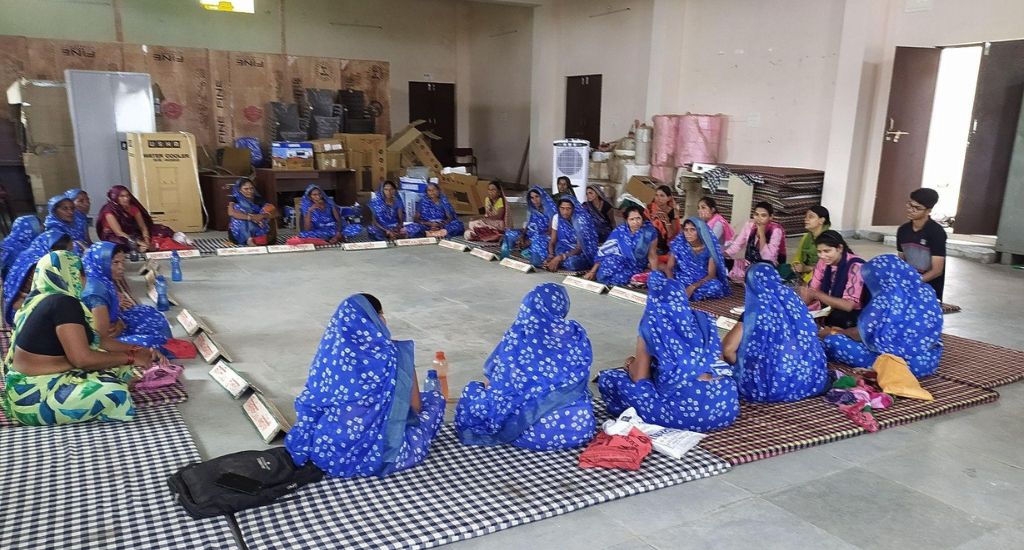
Food security improved by women’s groups in MP
Involving women self-help groups in the public distribution of food in Madhya Pradesh is strengthening food security, according to a development worker with Transform Rural India Foundation.

Involving women self-help groups in the public distribution of food in Madhya Pradesh is strengthening food security, according to a development worker with Transform Rural India Foundation.
There is happiness on the faces of the Public Distribution System (PDS) beneficiaries. “They brought a fair price shop (FPS) to our village. Earlier, we used to travel 5 kms to purchase our food grains”, said a beneficiary interviewed at Ganpur and Bidpura villages of the Dhar district.
Beneficiaries now have better access to the FPS since it is operated by a local women’s group. FPS also remain open for longer duration. Running an FPS is not easy and requires intensive time, money and management.
How has this change happened? Why did the local SHG take this initiative? How are they managing the affairs?
These were the questions I was confronted with during my field work.
In 2015, the Madhya Pradesh government under the National Food Security Act (NFSA) issued a PDS control order. This was to regulate private entity participation in public ownership of the FPS.

Under this, two-thirds of the FPS can be owned by co-operative societies while another one-thirds were mandatorily allotted to the SHGs or any other women’s organisation.
This policy inclusion would become the instrument for local groups to take initiative.
The 13 principles (13 sutriya) for SHGs promoted by the Madhya Pradesh State Rural Livelihood Mission (MPSRLM) further intensify this approach while broadening the vision of these collectives. These principles include a regular weekly meeting of SHGs, adoption of best practices for health, sanitation and education, participation in panchayat raj institutions, and reaching out to the beneficiaries.
This state initiative has further brought other positive changes in women and societies at large. What I am seeing in Bidpura and Ganpur village are some of the visible results. These shops are among 198 such FPS run by the SHGs in the Dhar district.
SHGs brought the first FPS ever to the village.
For the last 4 years, SHGs through their FPS have served the community without any disruption. During the covid-19 pandemic, SHG women acted as frontline workers to provide food grains to the beneficiaries.
Setting up basic FPS operation requires infrastructure and logistics. In the case of co-operative societies, these are provided to the sales people beforehand. This is not the case for SHGs.
Gita Didi (resource person for 12 village organisations) said that even the women who never spoke outside their house are having their say in front of the village panchayat (“bhaiya! Jo didi kabhi ghar se bahar baat nahi krti thi wo aaj panchayat ke samne apni baat rakhti hai”).
The FPS in Bidpura caters to three villages. SHGs have allocated two days per village per week. This reduces unnecessary overcrowding at the FPS.

FPS run by SHGs are also cleaner as compared to the FPS run by the co-operative. The amount of grain wastage was also very low in SHGs run FPS. I further observed that the FPS run by SHGs are more active compared to others in distributing the essential articles.
As the SHG salespeople are located in the village itself, there is a bonding between FPS owners and beneficiaries. In case of emergencies like outstation migration, social or private function, the beneficiaries are given foodgrains on priority. This reduces the possibility of exclusion.
Some beneficiaries even informed that they could get food grains after their work hours (from 10 am to 5 pm), especially in the case of daily wage workers. In Bidpura, the SHGs have come up with a rule – that no member of the group will receive the grains, until each beneficiary from the village has received them. This rule signifies the feeling of ‘community first’ within an SHG.
Various challenges with the operation of FPS remain due to policy flaws. First, the SHGs do not receive any formal training in FPS management. The control order does not stipulate any training.
Second, the financial viability is another major hurdle, especially for FPS run by SHGs. They are provided with a low commission of Rs. 8400 to run the FPS, which is usually spent on the maintenance of the FPS itself.
Thus SHGs are left with a minuscule amount. The SHGs have to pre-pay the grain procurement amount while the co-operative with cash flow receives it on credit. This rule base disparity pushes SHGs to depend on credit facilities.
Last is people’s perception. The FPS management is still considered a male-dominated workplace. The SHGs have to sometime face discrimination from the community. Promotional and awareness activities can be taken to avoid such asymmetry among the community.
(Also read: Surprising findings on India’s food habits)
Omkar Tanaji interned with the TRANSFORM RURUAL INDIA FOUNDATION (TRIF) Madhya Pradesh team during June-July 2022
The lead image at the top shows SHGs Cluster level monthly meeting on savings and lendings at Aajeevika Bhavan Manawar, Dhar district (Photo by Omkar Tanaji Deshmukh)